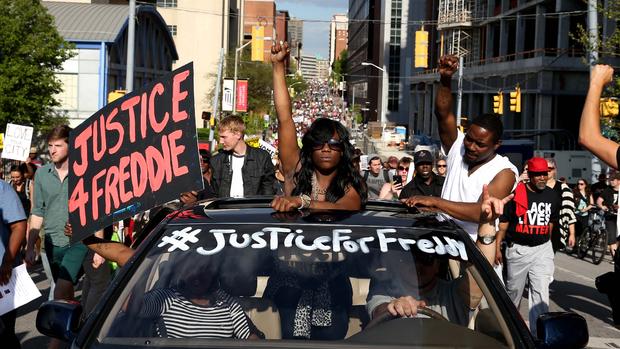Baltimore police tensions: One officer's perspective
On Friday evening, hours after six Baltimore police officers were charged in the death of 25-year-old Freddie Gray, another of the city's police officers reflected on the turmoil surrounding the case as he and his wife prepared to put their young baby to bed.
"Everyone emails saying there are credible threats against law enforcement and families, to the point that they're saying if you have police plates you might wanna take precautions [and] remove it," said the officer, who asked not to be named. For the purpose of this story, he and his wife will be referred to as Mr. and Mrs. Smith.
"We get cussed at, shot at. Crazy stuff is going on," he added.
Gray suffered ultimately fatal spinal injuries while being transported in a police van last month. His arms and legs were bound, but he wasn't secured within the vehicle by seatbelt, as he should have been according to department procedures. Gray's death sparked protests throughout the city, with tensions boiling over last Monday in the form of riots and violence directed at police, prompting the deployment of the National Guard and the enforcement of a citywide curfew.
State's Attorney Marilyn Mosby announced a host of charges against the six officers involved in Gray's arrest and transport, including involuntary manslaughter, official misconduct and false imprisonment - Gray never should have been arrested in the first place, Mosby said. The driver of the police van - Officer Caesar Goodson - has been charged with second-degree depraved-heart murder, the most serious of the charges leveled against the officers.
According to the Smiths, the charges seemed to be intended to "make an example" of the police officers.
"When I see what he goes through every night it's very hard not to sympathize with him and the police, and the officers who were arrested," said Mrs. Smith. "Given what the media has put up there and the facts that we know, [the charge] seems very extreme."
"The biggest thing i can see that wasn't done but should have been done is the buckling in. So from my understanding, that's a departmental policy and I can see being charged departmentally for that," said Mr. Smith.
Smith said he sympathized with the Gray family, but worries that the case - and the intense scrutiny it has brought to the department - could compromise police officers' ability do legitimate policing.
"I feel horrible for the family. It's a horrible circumstance that I cannot relate to. But if you think of [all] the officers who were not there, and they see the footage, and they see the case as a drug dealer ran and got hurt (...) a lot of the officers I could see them saying 'We're wrong no matter what,'" said Mr. Smith,
Mrs. Smith also cautioned against the media painting police officers with a broad brush.
"I feel like there's no words for some of the things we saw, how they treat the police as a whole and that's not how they all are. Of course being a police wife, I'm defensive and I care about my husband, so it brings about a whole different kind of stress."
"Now I have in my head that one little mistake or being associated with someone else who makes wrong decision can impact our entire lives.
The solution, they both agreed, was to focus on community outreach between officers and residents, especially in neighborhoods plagued by mistrust like West Baltimore.
"Anything that gets the police working with the community," Mr. Smith said. "Some local school did field trips with us to the park, and we did ... team-building with kids that were local in our area that we worked. ... I thought that was really good."
"I can see why they may not be thrilled to see us. But at the same time, just like they don't want us to discriminate against them, I don't want them to discriminate against me. I know I have a clean conscience."
